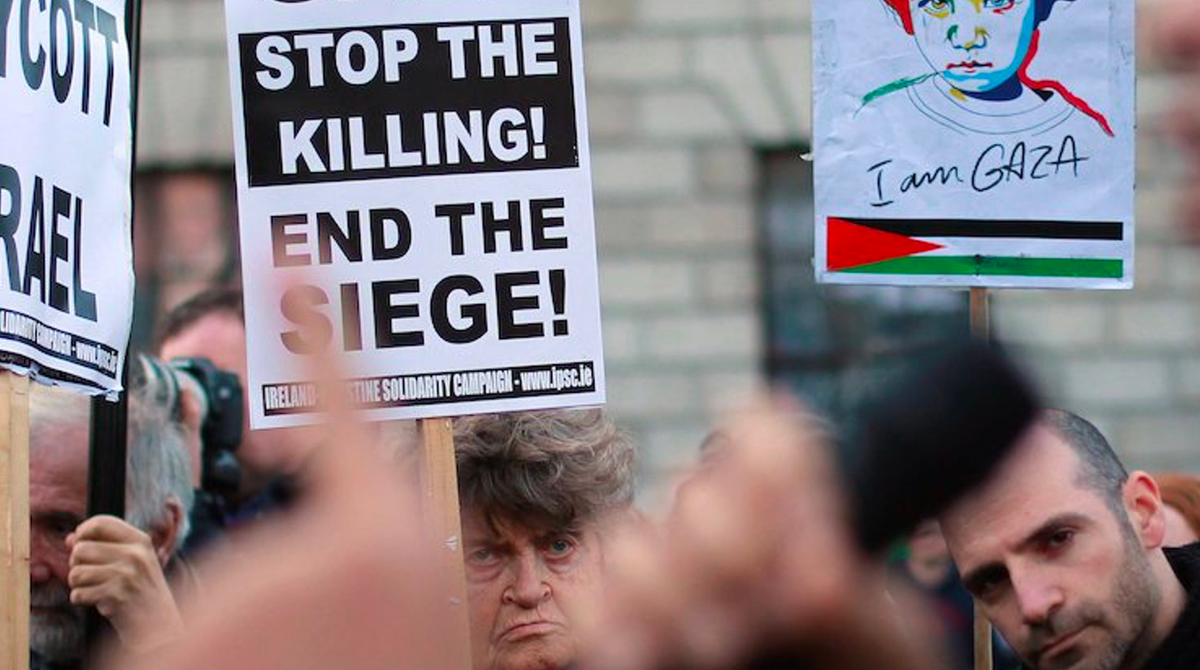By Alyssa Durnil, St. Edward's University '20
Advised by Professor Lauren Banko
Edited by Louie Lu, Daevan Mangalmurti, and Natalie Simpson
INTRODUCTION
There are two richly painted walls on each side of the intersection of Beechmount Avenue and Falls Road in Belfast, Northern Ireland. The smaller wall, visible on the right-hand side as one enters Beechmount Avenue, today commemorates the role of women in the first Irish parliament. But that mural is only the most recent in a line of at least twenty-three that have covered the wall and illustrated the concerns of residents of this heavily Catholic portion of Belfast over the years.
During the Troubles, the period from the 1960s to the 1990s during which Irish republicans sought to unify the island of Ireland, Beechmount Avenue was better known as RPG Avenue, “after the rocket-propelled grenade launcher often fired from there.” It was in 1982, during these years of violence, that the first mural in Northern Ireland with an international theme was painted on the Beechmount wall. Fittingly, it depicted “two male insurgents, from the PLO [Palestine Liberation Organization] and IRA [Irish Republican Army], jointly holding aloft a Russian rocket-propelled grenade launcher, a weapon that both groups used. Underneath was the slogan ‘One struggle.’ ” Whether groups like the PLO and IRA were considered terrorists, guerrillas, or freedom fighters was a matter of perspective. Initially, the IRA sought to vindicate their own violent political opposition by aligning themselves with similar movements around the globe as a means of portraying Irish republicanism as part of an international struggle against imperialism.
The partition of Ireland in 1920 created a fissure between the North and the South, and two Irish identities began to emerge as Irish collective memory was interpreted differently in accordance with current events. Elisabetta Viggiani asserts that “opposing public narratives of national identification [...] victimhood, moral justification for the use of violence and stigmatization of the adversary are projected by means of careful use of imagery, symbols, language and a process of selective remembering and social amnesia.” In Northern Ireland, republicans sought to replicate the Irish independence movement of the early twentieth century in hopes of unifying the Emerald Isle. Taking notes from the Celtic Revival, which “provided the basis for the nationalists’ political movement” of the 1910s and 1920s, Irish republicans began adopting Gaelic phrases as a means of promoting cultural nationalism.
In the mid to late twentieth century, Irish nationalist symbols, images, language, and flags began to be applied to or used in conjunction with left-wing nationalist movements across the world. The phrase “Tiocfaidh ár lá,” a Gaelic chant which translates to “Our day will come,” was popularized in Northern Ireland in the 1970s, the early years of the Troubles. This phrase has since been used in reference to similar revolutionary movements such as the Palestinian nationalist movement. The phrase signifies both hope and retribution: a promise that these ethnic groups will one day be free from foreign occupation of their homelands. This sense of a shared history stemming from parallel experiences is what defines the Irish-Palestinian connection. Ireland's support for the creation of an independent Palestinian state was first championed by the Provisional Irish Republican Army, which worked in conjunction with the Palestine Liberation Organization in the early 1970s, and by Irish civilians who campaigned for the government of Ireland to support Palestinian self-determination over Israeli settler colonialism. Following the outbreak of the Lebanese Civil War in 1975, when Irish soldiers were deployed to South Lebanon as peacekeepers for the United Nations, accusations of excessive force by Israeli soldiers against members of the Irish battalion inflamed tensions between Ireland and Israel, inadvertently reinforcing pro-Palestinian sentiments in Irish society. In response to the Palestine Liberation Organization’s efforts to disassociate itself from terrorist networks and appeal to European countries through diplomatic channels, Ireland called for a sovereign Palestinian state and led the European Economic Community to endorse Palestinian self-determination, thus enshrining in Irish foreign policy a steadfast commitment to human rights, international law, justice, and peace.

